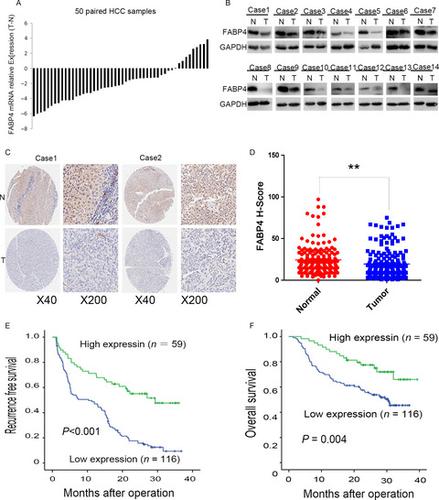当前位置:
X-MOL 学术
›
Cancer Med.
›
论文详情
Our official English website, www.x-mol.net, welcomes your
feedback! (Note: you will need to create a separate account there.)
FABP4 suppresses proliferation and invasion of hepatocellular carcinoma cells and predicts a poor prognosis for hepatocellular carcinoma
Cancer Medicine ( IF 2.9 ) Pub Date : , DOI: 10.1002/cam4.1511 Cheng-Qian Zhong 1, 2 , Xiu-Ping Zhang 1 , Ning Ma 3 , Er-Bin Zhang 3 , Jing-Jing Li 3 , Ya-Bo Jiang 1 , Yu-Zhen Gao 4 , Yan-Mei Yuan 1, 3 , Shi-Qian Lan 2 , Dong Xie 3 , Shu-Qun Cheng 1
Cancer Medicine ( IF 2.9 ) Pub Date : , DOI: 10.1002/cam4.1511 Cheng-Qian Zhong 1, 2 , Xiu-Ping Zhang 1 , Ning Ma 3 , Er-Bin Zhang 3 , Jing-Jing Li 3 , Ya-Bo Jiang 1 , Yu-Zhen Gao 4 , Yan-Mei Yuan 1, 3 , Shi-Qian Lan 2 , Dong Xie 3 , Shu-Qun Cheng 1
Affiliation

|
Adipocyte fatty acid‐binding protein (FABP4) is abundant in macrophage and adipocyte. It is known to be involved in lipid metabolism. The role of FABP4 has been reported in various cancers, such as non‐small cell lung cancer, breast cancer, ovarian cancer, and prostatic cancer. However, its role remains unclear in hepatocellular carcinoma (HCC). In our study, we investigated the expression of FABP4 at both mRNA and protein levels, and by examining 175 cases of patients with cancer of the liver tissue microarray, the significance between the expression of FABP4 and clinical characteristics had been discussed. We found that FABP4 was lowly expressed in HCC tissues compared to the corresponding tissue adjacent, and the expression of FABP4 was significantly associated with the tumor size, PVTT, recurrence‐free survival and overall survival. Moreover, multivariate Cox regression analysis indicated that the expression of FABP4, Alb, AFP, HBsAg, and PVTT were independent risk factors for overall survival, and the expression of FABP4, AFP, GGT, tumor size, and encapsulation were independent risk factors for HCC recurrence. In addition, we revealed that FABP4 suppressed HCC cell proliferation and invasion in vitro. Moreover, overexpression of FABP4 led to inhibit tumor growth and decreased tumor volume in vivo. These phenotypes were associated with altered expression of Snail and p‐STAT3. Our studies thus suggest that FABP4 could be a potential target for HCC chemotherapy.
中文翻译:

FABP4抑制肝癌细胞的增殖和侵袭并预测肝细胞癌的预后不良
脂肪细胞脂肪酸结合蛋白(FABP4)在巨噬细胞和脂肪细胞中含量丰富。已知与脂质代谢有关。已经报道了FABP4在各种癌症中的作用,例如非小细胞肺癌,乳腺癌,卵巢癌和前列腺癌。但是,其在肝细胞癌(HCC)中的作用仍不清楚。在我们的研究中,我们研究了FABP4在mRNA和蛋白水平上的表达,并通过检查175例肝癌组织芯片癌患者,探讨了FABP4的表达与临床特征之间的意义。我们发现,与邻近的相应组织相比,FABP4在肝癌组织中的表达低,并且FABP4的表达与肿瘤的大小,PVTT,无复发生存率和总生存率显着相关。而且,多元Cox回归分析表明,FABP4,Alb,AFP,HBsAg和PVTT的表达是整体生存的独立危险因素,而FABP4,AFP,GGT,肿瘤大小和包膜的表达是HCC复发的独立危险因素。另外,我们揭示了FABP4在体外抑制HCC细胞增殖和侵袭。此外,FABP4的过表达导致体内抑制肿瘤生长和减少肿瘤体积。这些表型与Snail和p-STAT3的表达改变有关。因此,我们的研究表明FABP4可能是HCC化疗的潜在靶标。和包埋是肝癌复发的独立危险因素。另外,我们揭示了FABP4在体外抑制HCC细胞增殖和侵袭。此外,FABP4的过表达导致体内抑制肿瘤生长和减少肿瘤体积。这些表型与Snail和p-STAT3的表达改变有关。因此,我们的研究表明FABP4可能是HCC化疗的潜在靶标。和包埋是肝癌复发的独立危险因素。另外,我们揭示了FABP4在体外抑制HCC细胞增殖和侵袭。此外,FABP4的过表达导致体内抑制肿瘤生长和减少肿瘤体积。这些表型与Snail和p-STAT3的表达改变有关。因此,我们的研究表明FABP4可能是HCC化疗的潜在靶标。
更新日期:2018-05-15
中文翻译:

FABP4抑制肝癌细胞的增殖和侵袭并预测肝细胞癌的预后不良
脂肪细胞脂肪酸结合蛋白(FABP4)在巨噬细胞和脂肪细胞中含量丰富。已知与脂质代谢有关。已经报道了FABP4在各种癌症中的作用,例如非小细胞肺癌,乳腺癌,卵巢癌和前列腺癌。但是,其在肝细胞癌(HCC)中的作用仍不清楚。在我们的研究中,我们研究了FABP4在mRNA和蛋白水平上的表达,并通过检查175例肝癌组织芯片癌患者,探讨了FABP4的表达与临床特征之间的意义。我们发现,与邻近的相应组织相比,FABP4在肝癌组织中的表达低,并且FABP4的表达与肿瘤的大小,PVTT,无复发生存率和总生存率显着相关。而且,多元Cox回归分析表明,FABP4,Alb,AFP,HBsAg和PVTT的表达是整体生存的独立危险因素,而FABP4,AFP,GGT,肿瘤大小和包膜的表达是HCC复发的独立危险因素。另外,我们揭示了FABP4在体外抑制HCC细胞增殖和侵袭。此外,FABP4的过表达导致体内抑制肿瘤生长和减少肿瘤体积。这些表型与Snail和p-STAT3的表达改变有关。因此,我们的研究表明FABP4可能是HCC化疗的潜在靶标。和包埋是肝癌复发的独立危险因素。另外,我们揭示了FABP4在体外抑制HCC细胞增殖和侵袭。此外,FABP4的过表达导致体内抑制肿瘤生长和减少肿瘤体积。这些表型与Snail和p-STAT3的表达改变有关。因此,我们的研究表明FABP4可能是HCC化疗的潜在靶标。和包埋是肝癌复发的独立危险因素。另外,我们揭示了FABP4在体外抑制HCC细胞增殖和侵袭。此外,FABP4的过表达导致体内抑制肿瘤生长和减少肿瘤体积。这些表型与Snail和p-STAT3的表达改变有关。因此,我们的研究表明FABP4可能是HCC化疗的潜在靶标。


















































 京公网安备 11010802027423号
京公网安备 11010802027423号